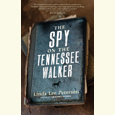Sins of the Father
In My Father, the Pornographer, acclaimed novelist Chris Offutt confesses a dubious legacy
“Very few of the boys I grew up with had finished high school, but they accepted that I was a writer,” Chris Offutt writes in the opening pages of My Father, the Pornographer. “I was merely doing what other men did—following in my father’s footsteps. Sonny was a plumber. The son of a local drunk was the town drunk in two towns. Sons of soldiers joined the army. That I had become a writer was perfectly normal.”
 What wasn’t “normal” was the double life Offutt’s father lived. Andrew J. Offutt published science-fiction stories and novels under his own name; he also published hundreds of pornographic novels under a variety of pseudonyms. Eventually the elder Offutt abandoned sci-fi altogether, devoting himself entirely to porn, with his long-suffering wife serving as typist. At his father’s death, Chris Offutt inherited nearly two tons of pornography—both his father’s work and the copious volumes of smut he compiled into three-ring binders of “research.” “If not for pornography, I’d have been a serial killer,” Offutt told his eldest son. With heartbreaking frankness, Chris Offutt examines one of the strangest, most extraordinary writing careers since L. Ron Hubbard or the Marquis de Sade, simultaneously exposing his own harrowing journey to adulthood with unflinching honesty and boundless grace.
What wasn’t “normal” was the double life Offutt’s father lived. Andrew J. Offutt published science-fiction stories and novels under his own name; he also published hundreds of pornographic novels under a variety of pseudonyms. Eventually the elder Offutt abandoned sci-fi altogether, devoting himself entirely to porn, with his long-suffering wife serving as typist. At his father’s death, Chris Offutt inherited nearly two tons of pornography—both his father’s work and the copious volumes of smut he compiled into three-ring binders of “research.” “If not for pornography, I’d have been a serial killer,” Offutt told his eldest son. With heartbreaking frankness, Chris Offutt examines one of the strangest, most extraordinary writing careers since L. Ron Hubbard or the Marquis de Sade, simultaneously exposing his own harrowing journey to adulthood with unflinching honesty and boundless grace.
Early on in My Father, the Pornographer, Chris Offutt recalls a phone conversation with his father after the latter’s diagnosis with alcohol-induced cirrhosis. “I’ve had a pretty good run,” Andrew Offutt says. “It’s hard to think of the world without me being in it.” Chris Offutt transforms the moment into a characteristically elegant reflection on the nature of memory. “There are times in people’s lives when a significant event occurs and they’re not aware of it,” he writes. “The last time you pick up a son before he’s too heavy, the final kiss of a marriage gone bad, the view of a beloved landscape. Weeks later, I realized that those were Dad’s last words to me.”
The elder Offutt’s death prompts his son to journey from his home in Oxford, Mississippi—where, after a stint as a screenwriter for True Blood, Treme, and Weeds, he now serves on the creative-writing faculty at Ole Miss—back to Kentucky to join his siblings as they put their father to rest. There, he receives his inheritance: his father’s many pseudonymously published novels, plus thousands of unpublished stories. Offutt decides to organize the material and create a bibliography of his father’s collection: “As a son, I wanted an opportunity to understand him further through his work,” Offutt writes. “In the following weeks each of my siblings privately thanked me for taking on the job of the office. They expressed concern that I’d be overwhelmed by the effort or emotionally done in. I explained that with Dad dead, I was able to separate the writer from the man, and the man from our father. They only partially believed me. As it turned out, it was only partially true.” The journey on which Offutt subsequently embarks results in both an astonishing literary biography and a traumatic narrative of self-discovery.
 Offutt is not interested in titillation. Instead, his goal is to explore the complex history of a strange and brilliant man who evolved from a typical post-WW II businessman to a promising science-fiction writer and eventually to a jaw-droppingly prolific author of erotic fiction. Offutt quite sensitively depicts how a traditional churchgoing Kentucky insurance salesman—a member of the so-called “silent generation”—became a long-haired, bearded, bell-bottom wearing sexual adventurer, enacting fantasies both on the page and in real life. It is a singularly American story, sometimes wry and funny, genuinely bizarre, and frequently heartbreaking in its depiction of the consequences of the elder Offutt’s obsessions.
Offutt is not interested in titillation. Instead, his goal is to explore the complex history of a strange and brilliant man who evolved from a typical post-WW II businessman to a promising science-fiction writer and eventually to a jaw-droppingly prolific author of erotic fiction. Offutt quite sensitively depicts how a traditional churchgoing Kentucky insurance salesman—a member of the so-called “silent generation”—became a long-haired, bearded, bell-bottom wearing sexual adventurer, enacting fantasies both on the page and in real life. It is a singularly American story, sometimes wry and funny, genuinely bizarre, and frequently heartbreaking in its depiction of the consequences of the elder Offutt’s obsessions.
The book’s second purpose is to study the parallels—sometimes implicit, sometimes direct—between the writing lives of father and son. Andrew Offutt allegedly began writing pornography to pay for his son’s extensive orthodontic work; Chris Offutt temporarily turned from literary fiction to writing for television in order to put his sons through college. The difference seems to be that the younger Offutt treats his commercial work as a necessary divergence, while the elder finds in it his calling. Its discovery transforms him into a monstrous father who threatens to kill his children for making too much noise while he’s trying to write. Even today, in the midst of a respected literary career, the younger Offutt feels inferior to his smut-peddling father: “There is part of me, one I despise, that insists upon comparing myself to my father,” he writes. “Dad wrote more books. He stayed married to one wife. He maintained a single, unflinching focus on his rebellious obsessions despite the odds against him. He wanted me to be my own man, and I suppose I am. But we are similar in many ways, chillingly similar. We work hard. We never give up. We don’t suffer fools gladly. We prefer our time alone, away from people. We write and write and write.”
Chris Offutt followed his father into the writing life, but his father’s influence had grimmer consequences, too, and they explain the profound sadness of Offutt’s adolescence. Still, Offutt regards his father with compassion, and his genuine desire to understand the man, a desire rooted in a love that seems entirely undeserved and yet completely persuasive, results in a portrait of American ambition and self-invention that is as affecting as it is astonishing. But the hero of the story is Offutt himself, who has emerged from the ordeal of his childhood as a consummate artist and a man of remarkable compassion.
“If you’re going to write a memoir,” a respected teacher once told me, “you must have either an extraordinary life story or a voice too powerful and captivating to be ignored.” Chris Offutt clearly belongs to a third category: he has both an astounding story and a voice that is wise, generous, and utterly compelling. The courage it must have taken to write this book is beyond reckoning, both in terms of its honesty and its psychic toll on its author. My Father, the Pornographer teaches powerful lessons about the possibility of reconciliation, healing, and the transformative power of staring down the truth without flinching.

Ed Tarkington is the author of the debut novel Only Love Can Break Your Heart, published by Algonquin Books in January 2016. He lives in Nashville.


